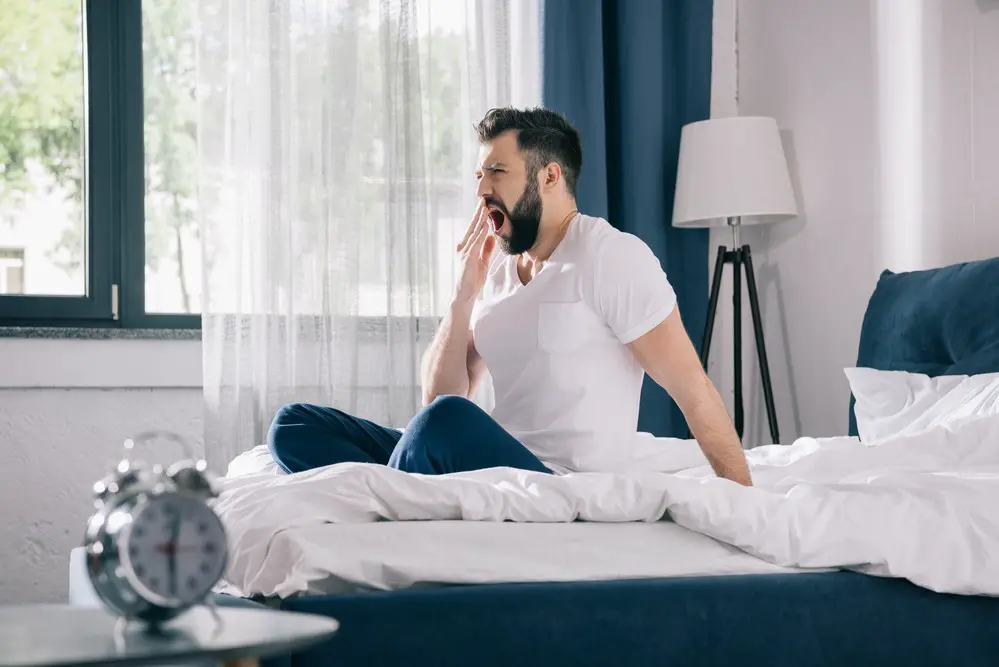As a BetterHelp affiliate, we receive compensation from BetterHelp if you purchase products or services through the links provided
Waking up tired, even after 8 hours of sleep, can be a frustrating experience for many people. Numerous factors can contribute to this persistent exhaustion, ranging from lifestyle habits to underlying medical conditions. Understanding the reasons behind this phenomenon and improving sleep quality will benefit those constantly fighting fatigue.
Sleep is a crucial component of overall health and well-being, and consistently waking up tired can harm a person’s daily functioning and productivity. It is, therefore, essential to examine the potential causes of this issue, including sleep disruptions, poor sleep hygiene, and certain health problems. By doing so, individuals can achieve more restorative sleep and wake up refreshed and energized.
Key Takeaways
- Waking up tired despite sufficient sleep may be due to sleep disruptions or underlying health issues.
- Identifying and addressing the causes can improve sleep quality and daily functioning.
- Seeking professional help may be necessary if lifestyle changes do not yield significant results.
Causes of Waking Up Tired
Sleep Quality Factors
Adequate sleep is essential for maintaining energy levels and overall health, but several factors can negatively impact sleep quality. These factors may include inconsistencies in sleep schedule, poor sleep hygiene, and an uncomfortable sleep environment. Stress, anxiety, and depression can also significantly reduce the quality of sleep, leading to feelings of fatigue despite getting eight hours of rest.
Sleep Disorders
Various sleep disorders can result in waking up tired after eight hours of sleep. Sleep apnea, insomnia, restless legs syndrome, and narcolepsy are some common examples. Obstructive sleep apnea, characterized by snoring and sleep disruption, can lead to fragmented sleep and feelings of fatigue upon waking. Chronic insomnia can result in difficulty falling asleep, while restless legs syndrome can disrupt restful sleep due to an uncontrollable urge to move the legs.
Lifestyle and Health Conditions
Underlying health conditions like anemia or iron deficiency can lead to lethargy and a lack of energy. Hypothyroidism, a medical condition affecting the thyroid glands, can also provoke fatigue and sluggishness. Additionally, lifestyle choices like consuming excessive caffeine or alcohol, inadequate exercise or overtraining, and poor diet can contribute to waking up tired after eight hours of sleep.
Other health-related factors can include:
- Infections, like a cold or bacterial infection
- Hormonal imbalances
- Dehydration due to insufficient water intake

Sleep Inertia
Sleep inertia, a state of grogginess and impaired mental performance upon awakening, can be a common reason for feeling tired after eight hours of sleep. This phenomenon is caused by an abrupt interruption of the body’s rhythms during deep sleep, specifically the rapid eye movement (REM) stage. Factors that can exacerbate sleep inertia include:
- Oversleeping
- Fragmented sleep
- Sudden changes in sleep patterns or circadian rhythm
To combat sleep inertia, it can be beneficial to establish consistent sleep schedules, maintain a sleep-promoting environment, and practice relaxation techniques such as meditation before bedtime. Implementing good sleep hygiene and addressing underlying health issues can also assist in alleviating the feeling of tiredness despite getting eight hours of sleep.
Improving Sleep Quality
Sleep Hygiene
Practicing good sleep hygiene helps improve sleep quality, allowing individuals to feel refreshed upon waking. It involves creating and following a consistent sleep schedule, ensuring the sleep environment is comfortable, and minimizing exposure to artificial light before bedtime.
To create a conducive sleep environment, consider the following:
- Maintain a cool, dark, and quiet bedroom
- Invest in a comfortable mattress and pillows
- Eliminate electronic devices from the bedroom as they emit blue light that can interfere with melatonin production.
Setting a consistent sleep schedule means going to bed and waking up simultaneously every day, even on weekends. This helps regulate the body’s internal clock, known as the circadian rhythm.
Diet and Exercise
Diet and exercise play crucial roles in sleep quality. Regular exercise can help reduce stress, increase daytime alertness, and promote better sleep patterns. However, avoiding vigorous exercise close to bedtime is best, as it can make falling asleep more difficult.
Certain dietary choices may also impact sleep quality:
- Limit caffeine and alcohol intake, as they can disrupt sleep patterns
- Consume foods rich in tryptophan, such as turkey, almonds, and milk, to promote melatonin production
- Avoid large meals and spicy foods before bedtime, which can cause discomfort and interfere with restful sleep
Stress and Anxiety Management
Elevated stress and anxiety levels can negatively affect sleep quality. Developing techniques to manage stress and anxiety can improve overall mental health and create an environment conducive to restful sleep. Some helpful practices include:
- Incorporate relaxation techniques, like deep breathing and progressive muscle relaxation
- Practice mindfulness meditation to help alleviate stress and promote sleep
- Keep a worry journal and write down concerns before bedtime to help clear the mind
Addressing these factors and following the suggested steps can significantly improve sleep quality, ensuring individuals wake up feeling rested and rejuvenated after eight hours of sleep.
When to Seek Professional Help
There are several instances where individuals should seek professional help for consistent feelings of fatigue despite getting eight hours of sleep. Sleep disorders and underlying medical conditions may be causing their constant tiredness.
Sleep disorders such as insomnia, sleep apnea, and narcolepsy can prevent a person from getting restful sleep. Insomnia can make it difficult to fall asleep or stay asleep throughout the night. Sleep apnea, specifically obstructive sleep apnea, causes a person’s breathing to be frequently disrupted during sleep. Narcolepsy is characterized by excessive daytime sleepiness and sudden sleep attacks.
Other disorders related to sleep include restless leg syndrome, which is the uncontrollable urge to move your legs during sleep, and chronic fatigue syndrome, which causes ongoing, unexplained fatigue. These conditions may be the reason for waking up tired even after a full night’s rest.
Underlying health conditions such as thyroid or other medical conditions can manifest as persistent fatigue. Hypothyroidism, for instance, can cause sleep disturbances and decreased energy levels. An individual experiencing prolonged fatigue should consult a healthcare professional to rule out any health problems causing their tiredness.
In conclusion, individuals who consistently wake up tired after adequate sleep should seek professional help. A healthcare provider can assess for sleep disorders, underlying medical conditions, or other fatigue-related factors. Identifying and treating the root cause can help improve sleep quality and overall well-being.
Frequently Asked Questions
Why am I exhausted daily?
There could be various reasons for daily exhaustion. It may be due to poor sleep quality, sleep disorders, stress, diet, or a sedentary lifestyle. Identifying the cause and addressing it for improved energy levels is important.
How to stop waking up tired?
To stop waking up tired, try maintaining a consistent sleep schedule, create a relaxing bedtime routine, ensure your sleep environment is comfortable, avoid heavy meals and caffeine close to bedtime, and exercise regularly.
Why am I tired in the morning?
Morning tiredness can result from disturbed sleep, waking up during deep sleep cycles, or going to bed too late. Factors like stress, an uncomfortable sleep environment, or an underlying sleep disorder can also contribute.
Feeling tired after a long sleep?
While it may seem counterintuitive, feeling tired after a long sleep can occur when the quality of sleep is poor or you are sleeping more than you need. Ensuring good sleep quality is crucial for feeling refreshed.
Tired 2 hours after waking up?
Tiredness after waking up could be due to dehydration, a lack of nutrients in your diet, or insufficient morning sunlight exposure, which helps regulate the body’s internal clock. Incorporating a healthy morning routine can help.
Always tired, no energy?
If you are always tired and have no energy, it could signify a medical condition, such as anemia, thyroid problems, or sleep disorders. Consult with a healthcare professional to determine the cause and appropriate treatment.
- 3 Ways Wearing a Hat Can Help Lower Your Stress Levels - April 19, 2025
- Breaking the Silence: Why Men’s Mental Health Matters More Than Ever - April 15, 2025
- How to Transform a Home’s Patio Space into a Relaxing Space - March 23, 2025
This site contains affiliate links to products. We will receive a commission for purchases made through these links.



